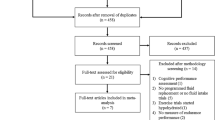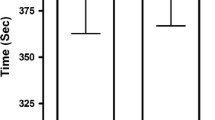Abstract
The aim of this study is to investigate the effects of CHO ingestion during high intensity exercise performance lasting approximately 25 min. Twelve endurance trained male cyclists (age 19–41 years; body mass 73.2 ± 4.2 kg; VO2max 66.4 ± 6.2 ml kg−1 min−1) completed a simulated 16 km time trial (457 ± 37 kJ) time trial in the lab on three occasions. Once they received a 6% carbohydrate electrolyte solution (CHO) and twice they received the same electrolyte containing placebo drink (PLA). Carbohydrate or placebo drinks were ingested 5 min before the start (4 ml kg−1) and at 25, 50, and 75% of completion of the time trial (1.4 ml kg−1). The CHO drink was a 6% sucrose–glucose–electrolyte solution. No differences were observed in the time to complete the time trials with either treatment. Time in min:s were 25:30 ± 1:34 and 25:27 ± 1:46 for the two placebo trials and 25:38 ± 1:59 in the CHO trial. Power output during the time trials was also remarkably similar: 300 ± 37 W, 301 ± 39 W and 299 ± 40 W, respectively. Pacing strategies and heart rate were identical in all three trials. From the two placebo trials, a coefficient of variation for this performance task was calculated to be 1.1%. Data from this study provides evidence that carbohydrate ingestion during short high intensity exercise (~30 min, 85–90% VO2max) does not improve performance. Furthermore, this study found a very low coefficient of variation (1.1%) for a simulated 16 km time trial.

Similar content being viewed by others
References
Anantaraman R, Carmines AA, Gaesser GA, Weltman A (1995) Effects of carbohydrate supplementation on performance during 1 h of high intensity exercise. Int J Sports Med 16:461–465
Below PR, Mora-Rodríguez R, Gonzáles Alonso J, Coyle EF (1995) Fluid and carbohydrate ingestion independently improve performance during 1 h of intense exercise. Med Sci Sports Exerc 27:200–210
Carter J, Jeukendrup AE, Mundel T, Jones DA (2003) Carbohydrate supplementation improves moderate and high-intensity exercise in the heat. Pflugers Arch 446:211–219
Carter J, Jeukendrup AE, Jones DA (2005) The effect of sweetness on the efficacy of carbohydrate supplementation during exercise in the heat. Can J Appl Physiol 30:379–391
Carter JM, Jeukendrup AE, Jones DA (2004a) The effect of carbohydrate mouth rinse on 1-h cycle time trial performance. Med Sci Sports Exerc 36:2107–2111
Carter JM, Jeukendrup AE, Mann CH, Jones DA (2004b) The effect of glucose infusion on glucose kinetics during a 1-h time trial. Med Sci Sports Exerc 36:1543–1550
Clark VR, Hopkins WG, Hawley JA, Burke LM (2000) Placebo effect of carbohydrate feedings during a 40-km cycling time trial. Med Sci Sports Exerc 32:1642–1647
Coyle EF, Coggan AR, Hemmert MK, Ivy JL (1986) Muscle glycogen utilization during prolonged strenuous exercise when fed carbohydrate. J Appl Physiol 61:165–172
Currell K, Jeukendrup AE (2008) Validity, reliability and sensitivity of measures of sporting performance. Sports Med 38:297–316
Desbrow B, Anderson S, Barrett J, Rao E, Hargreaves M (2004) Carbohydrate-electrolyte feedings and 1 h time trial cycling performance. Int J Sport Nutr Exerc Metab 14:541–549
el-Sayed MS, Balmer J, Rattu AJ (1997) Carbohydrate ingestion improves endurance performance during a 1 h simulated time trial. J Sports Sci 15:223–230
Jeukendrup A, Brouns F, Wagenmakers A, Saris W (1997) Carbohydrate-electrolyte feedings improve 1 h time trial cycling performance. Int J Sports Med 18:125–129
Jeukendrup AE, Saris WHM, Brouns F, Kester ADM (1996) A new validated endurance performance test. Med Sci Sports Exerc 28:266–270
Laursen PB, Shing CM, Jenkins DG (2003) Reproducibility of a laboratory-based 40-km cycle time-trial on a stationary wind-trainer in highly trained cyclists. Int J Sports Med 24:481–485
Maresh CM, Herrera-Soto JA, Armstrong LE, Casa DJ, Kavouras SA, Hacker FT Jr, Elliott TA, Stoppani J, Scheett TP (2001) Perceptual responses in the heat after brief intravenous versus oral rehydration. Med Sci Sports Exerc 33:1039–1045
McConell GK, Canny BJ, Daddo MC, Nance MJ, Snow RJ (2000) Effect of carbohydrate ingestion on glucose kinetics and muscle metabolism during intense endurance exercise. J Appl Physiol 89:1690–1698
Nybo L (2003) CNS fatigue and prolonged exercise: effect of glucose supplementation. Med Sci Sports Exerc 35:589–594
Palmer GS, Dennis SC, Noakes TD, Hawley JA (1996) Assessment of the reproducibility of performance testing on an air-braked cycle ergometer. Int J Sports Med 17:293–298
Palmer GS, Clancy MC, Hawley JA, Rodger IM, Burke LM, Noakes TD (1998) Carbohydrate ingestion immediately before exercise does not improve 20 km time trial performance in well trained cyclists. Int J Sports Med 19:415–418
Powers SK, Lawler J, Dodd S, Tulley R, Landry G, Wheeler K (1990) Fluid replacement drinks during high intensity exercise: effects on minimizing exercise-induced disturbances in homeostasis. Eur J Appl Physiol 60:54–60
Rauch HG, Hawley JA, Woodey M, Noakes TD, Dennis SC (1999) Effects of ingesting a sports bar versus glucose polymer on substrate utilisation and ultra-endurance performance. Int J Sports Med 20:252–257
Riebe D, Maresh CM, Armstrong LE, Kenefick RW, Castellani JW, Echegaray ME, Clark BA, Camaione DN (1997) Effects of oral and intravenous rehydration on ratings of perceived exertion and thirst. Med Sci Sports Exerc 29:117–124
Romijn JA, Coyle EF, Sidossis LS, Gastaldelli A, Horowitz JF, Endert E, Wolfe RR (1993) Regulation of endogenous fat and carbohydrate metabolism in relation to exercise intensity. Am J Physiol 265:E380–E391
van Loon LJ, Greenhaff PL, Constantin-Teodosiu D, Saris WH, Wagenmakers AJ (2001) The effects of increasing exercise intensity on muscle fuel utilisation in humans. J Physiol 536:295–304
Acknowledgments
This study was supported by a research grant by the Gatorade Sport Science Institute. Luis Fernando Aragón Vargas, is a consulting Scientist for Latin America and Europe, Gatorade Sports Science Institute. The results of the present study do not constitute endorsement by ACSM.
Author information
Authors and Affiliations
Corresponding author
Rights and permissions
About this article
Cite this article
Jeukendrup, A.E., Hopkins, S., Aragón-Vargas, L.F. et al. No effect of carbohydrate feeding on 16 km cycling time trial performance. Eur J Appl Physiol 104, 831–837 (2008). https://doi.org/10.1007/s00421-008-0838-z
Accepted:
Published:
Issue Date:
DOI: https://doi.org/10.1007/s00421-008-0838-z




